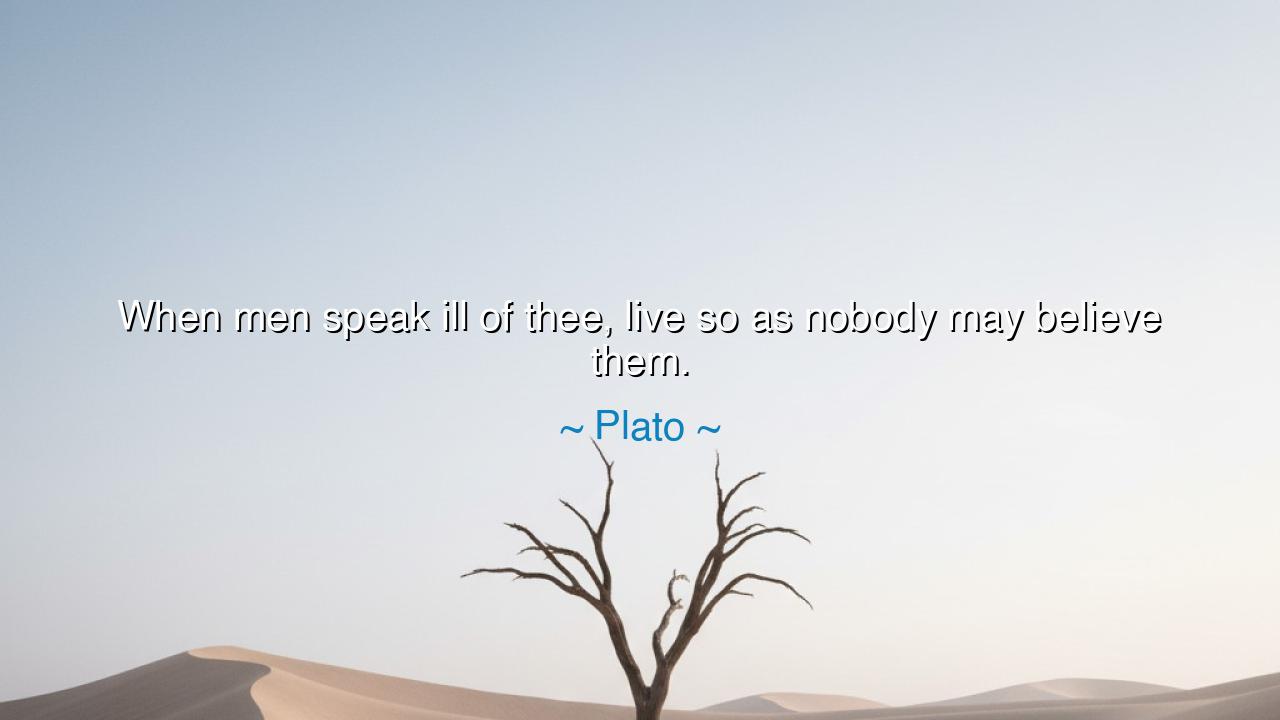
When men speak ill of thee, live so as nobody may believe them.






Listen, O children of wisdom, to the words of Plato, whose teachings still echo through the halls of time. He spoke thus: "When men speak ill of thee, live so as nobody may believe them." These words are not mere advice, but a powerful declaration of the way a man must live — with honor, virtue, and integrity. For in the lives we lead, we find the strength to silence the voices of detractors and to stand strong against the forces that seek to tarnish our reputation.
Plato’s wisdom here teaches us a profound truth: it is not the words of others that define us, but the actions we take and the lives we lead. When others speak ill of us, let them not find fertile ground in which to plant their lies and accusations. Live in such a way that no one can believe the falsehoods spoken against you, for a life of virtue speaks louder than any slander. The highest form of defense against defamation is not to engage in battle with words, but to continue walking the path of righteousness with unwavering resolve.
Consider, dear ones, the example of Socrates, Plato’s own teacher, who embodied this very principle. Socrates was a man who, though beloved by many, was reviled by the powerful and the ignorant. He was accused of corrupting the youth of Athens, of introducing strange ideas that threatened the status quo. Yet, in his trial, Socrates did not engage in anger or fear. Instead, he held firm to his beliefs, answering his accusers with wisdom and clarity. He did not fight against the lies with bitterness, but lived so fully and honestly that his life became a testament to his truth. Even in the face of death, Socrates' life proved that a man of virtue cannot be undone by the voices of the ignorant.
This truth is as old as the stars themselves. The great warrior-king Alexander the Great, whose name was spoken with both admiration and jealousy across the world, understood this. When rumors were spread about his character, he did not waste his time denying them. Instead, he led his men into battle, conquered empires, and built a legacy that spoke for itself. His life, full of triumphs and struggles, was a shining testament to the fact that the most powerful response to slander is to live with strength, courage, and conviction.
Plato’s wisdom calls us to rise above the pettiness of others. There will always be those who speak against you, who seek to diminish your name and sow discord among your peers. But the greatest response to their venom is to live in such a way that your actions prove them false. Let your life be a reflection of your inner truth. Let your deeds speak louder than their words. When others see your honesty, your kindness, your dedication, and your integrity, they will know the truth, and the lies will fall away like dust in the wind.
The lesson we must carry forward is this: Let your actions be your defense. When the winds of gossip and slander blow in your direction, stand firm in your truth. Do not waste your breath defending yourself against the voices of those who do not understand you. Instead, live so that no one may question your character or your purpose. Live with such grace and strength that the accusations of others become irrelevant, as they are seen for what they truly are — nothing but hollow words, lost in the face of your unshakable virtue.
And so, O children of wisdom, take this lesson to heart: The way you live your life is the truest form of defense. Build your character on the foundations of honesty, courage, and integrity, and let the world see the truth of who you are. In this way, the falsehoods of others will have no power over you. Live as the noble do, with honor and strength, and let your actions carry the weight of your truth. May your life, like that of Socrates, Alexander, and all those who have come before, become a living testament to the power of virtue over slander.






AAdministratorAdministrator
Welcome, honored guests. Please leave a comment, we will respond soon